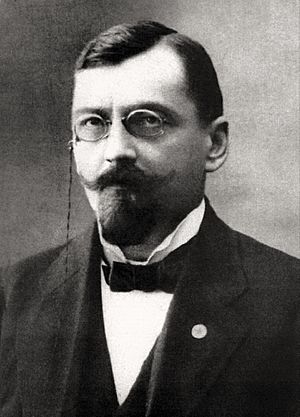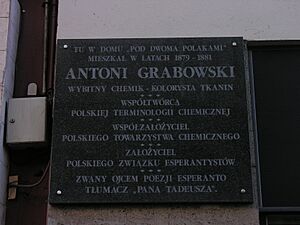Antoni Grabowski facts for kids
Antoni Grabowski (born June 11, 1857 – died July 4, 1921) was a Polish chemical engineer and an important person in the early Esperanto movement. His translations of books and poems helped Esperanto grow into a language used for literature.
Contents
A Smart Student and Engineer
Antoni Grabowski was born in a small village called Nowe Dobra in Poland. His family moved to Thorn (now Toruń) when he was very young. His parents were not rich, so Antoni had to start working after elementary school. But he loved learning! He studied hard by himself and passed the entrance exam for high school (called a Gymnasium) with excellent results.
At the Copernicus School in Thorn, he was so smart that he skipped two grades because he knew so much more than other kids his age. In 1879, his family's money situation got better. After finishing high school, Grabowski went to the University of Breslau (now Wrocław) to study philosophy and natural science.
After university, he became a chemical engineer. He worked in different places, including what is now the Czech Republic. He even managed a textile factory in Russia.
Antoni Grabowski was very good at his job. He was known across Europe for inventing new things and improving technology in chemistry. He wrote many articles about his inventions in science magazines. He also translated an important chemistry textbook from English into Polish. Later, he helped create Polish technical words for science. In 1906, he published the first Polish chemical dictionary.
His Journey with Languages
Even when he was at university, Grabowski loved literature and joined a literary club. He didn't just focus on Polish language; he learned many languages and became a true polyglot. This means he could speak many languages! Besides Polish, he could speak nine other languages and understand at least 15 more.
Because he loved languages so much, Grabowski became interested in the idea of an international language – a language everyone could use to talk to each other. He learned a language called Volapük. He even went to visit Johann Schleyer, who created Volapük. But he was disappointed because even Schleyer couldn't speak Volapük easily, and they had to talk in German instead. Grabowski realized Volapük wasn't practical for everyday use. After this, he stopped working with Volapük but still wanted to find a good international language.
Discovering Esperanto
In 1887, Antoni Grabowski read a book called Dr. Esperanto's International Language. This book was written by Ludwik L. Zamenhof and introduced his new language project, which soon became known as Esperanto. Grabowski was very impressed by how clear and easy to learn Esperanto seemed. He thought it could be learned surprisingly fast.
He traveled to Warsaw to meet Zamenhof, and they had the very first spoken conversation in Esperanto!
Helping Esperanto Grow
Like Zamenhof, Grabowski understood that literature was very important for a language to grow and become useful in all parts of life. He started working on this right away. In 1888, he translated a Russian short story by Alexander Pushkin into Esperanto. Then, in 1889, he translated a German play by Johann Wolfgang von Goethe. These were some of the first books ever translated into Esperanto.
In the early 1890s, Grabowski felt that Esperanto was spreading too slowly. He thought there might be "imperfections" in the language. He even suggested some changes. However, in a vote among Esperantists in 1894, he voted against changing the language. For a while, he even worked on his own planned language called "Modern Latin." But soon, he decided to stick with the original rules of Esperanto, known as the Fundamento de Esperanto.
Grabowski was the president of the Warsaw Esperanto Society, which started in 1904. He also led the Polish Esperanto Society, founded in 1908. In the same year, he became a director in the Esperanto Academy, which helps guide the language. He wrote articles, gave talks, and organized Esperanto language classes.
From 1908 to 1914, Grabowski taught the first Esperanto courses in some schools in Warsaw. He wrote an article in 1908 explaining that learning Esperanto as your first foreign language could actually help you learn other languages like French and Latin much better. This idea was quite new at the time!
In 1913, he published a collection of poems called El Parnaso de Popoloj ("From The Parnassus Of The Peoples"). It had 116 poems from 30 different languages and cultures. Six of the poems were originally written in Esperanto, and the other 110 were translated into Esperanto from other languages.
Difficult Times and Lasting Work
During World War I, Grabowski was separated from his family, who had gone to Russia. He stayed in Warsaw, feeling sick and alone. During this time, he worked on translating the famous Polish story Pan Tadeusz by Adam Mickiewicz into Esperanto. He made sure his translation was very accurate to the original. This work showed how much potential Esperanto had and helped Esperanto poetry grow even more.
Grabowski had a long-term heart problem and couldn't afford the medicine he needed. He lived in great poverty. When his family returned after the war, he was very thin and weak. But he kept working on Esperanto until he passed away from a heart attack in Warsaw in 1921.
See Also
 In Spanish: Antoni Grabowski para niños
In Spanish: Antoni Grabowski para niños
 | Leon Lynch |
 | Milton P. Webster |
 | Ferdinand Smith |



